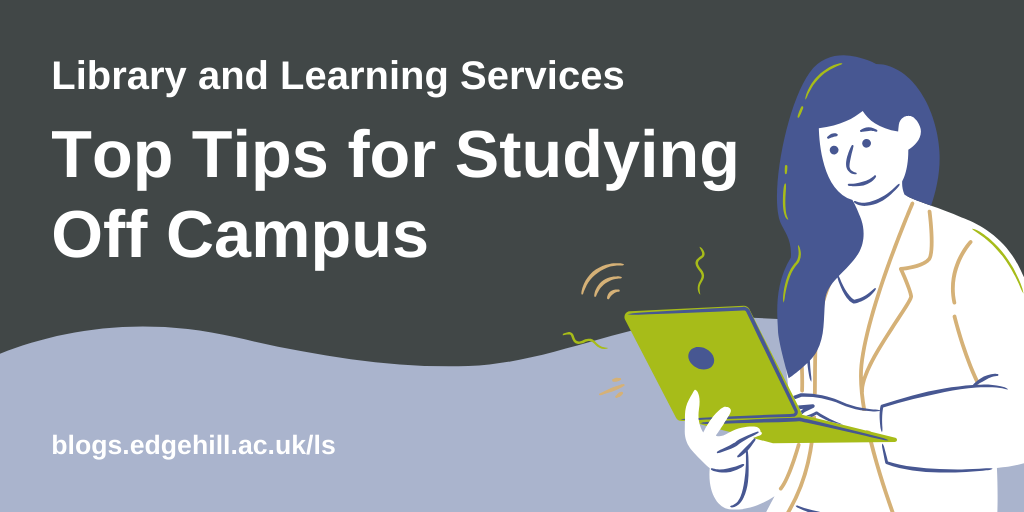If like all of us in Library & Learning Services you are missing Catalyst, and haven’t quite perfected your new study space, we hope these handy tips will provide some useful guidance on how to make the most of your off campus studying.

Tip 1: Plan (and adapt) your new study routine
It can be challenging when your regular routine changes, even more so when it is out of our control, so taking time to plan a new study routine is a great place to start – think about what works best for you! Start small and plan a day/week at a time or look ahead and plan backwards from future deadlines and/or assessment dates. Although it isn’t always possible to plan for every eventuality it is sensible to set boundaries and consider other commitments, such as childcare or employment, when adapting to your ‘new’ routine.
A good daily routine can be as simple as getting up at a set time, changing out of your sleepwear and eating breakfast before starting your day ahead…and don’t forget to include an end routine to bring your study to a close. Take a look at our UniSkills Getting Organised webpages for lots of useful guides and toolkits to help you effectively prioritise your time.
Tip 2: Study Happy ?
It is equally important to factor in some downtime alongside your studies to ensure you maintain a good study-life balance. By creating your own physical ‘study’ space (which could be as lavish as a home office, or as simple as a comfy spot on your bedroom floor) it will establish one of those all-important boundaries and help put you in the right mindset to work when you are there…and it will also enable you to ‘leave’ and get some headspace away from your studies. Why not revisit Student Advisor Maisie’s Study Happy Student Tips blog or remind yourself of all our Student Advisors’ top study happy tips in the UniSkills: Be Study Happy! video:
Although it can be tempting to sit in front of a screen all day (computer/smartphone/TV) it isn’t healthy nor productive. Make the most of your daily exercise and get outside! Be that on a walk/run/bike ride, sitting in your garden reading or digging up some weeds, it is all extremely beneficial for your mental wellbeing! And if you don’t have access to a garden, why not create your own eco-friendly planters out of old newspapers or empty toilet rolls and grow some seeds on your windowsills!
Tip 3: Engage with your learning communities
Don’t forget that as an Edge Hill University student you are part of a wider learning community, so make sure you are engaging with your peers and wider support networks. Your tutors will be keeping in touch with you through online teaching and making sure you have the necessary information about your research, coursework and assessments, but they are also there for you if you have any subject specific queries or just feel a little bit overwhelmed by it all – and they can direct you to other support services, if needed. You could also set up/join an online study group with your course mates to discuss research and keep each other motivated!
UniSkills also offers a learning community where you can take part in online webinars alongside students from a variety of courses and years – a really great way to share knowledge and experience with peers from across the University! There are a wide range of academic skills webinars available for you to join including academic writing, referencing and being critical – check out the latest schedule and book your place online today.
Tip 4: Make the most of your eResources
A physical trip to the bookshelves might not be an option right now but with access to over 248,900 online resources, via the Library Catalogue, Discover More and online specialist subject databases, and many publishers around the world making additional content temporarily available, there’ll be no stopping you! And if you need any help finding and/or navigating your online resources you can book a UniSkills virtual 1-2-1 Information Skills appointment. Read more about studying online, and the support available from Library and Learning Services, in our Studying Online: Your Digital Library blog.
Tip 5: You are not alone!
Although it may feel like you are fully self-isolated right now it is important to remember you are not alone and there is lots of help and support available…
- Keep in contact with your social circle of friends/family through regular video calls or online chats!
- Engage with your online learning, speak to your tutors and maintain connections with your peers!
- Join a UniSkills Webinar to develop your academic skills and chat with other students!
- Book a 1-2-1 appointment for help finding/navigating your online resources and academic writing/referencing!
- Keep up to date with Accessing Library and Learning Services Online!
- If you are struggling with your mental wellbeing Student Services have put together a range of resources to help you during this time and you have 24/7 access to the Big White Wall.
- And remember, you can always contact the Catalyst Helpdesk virtually via email or live chat.
